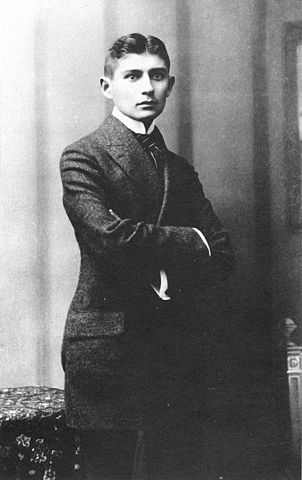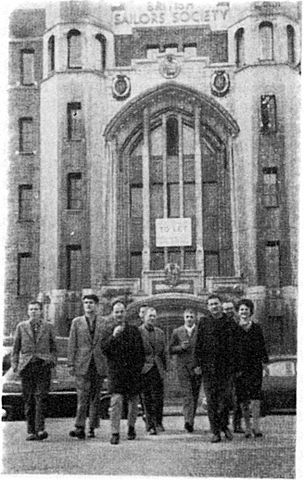The forthcoming Myths and Realities event at
the British Library (to be held on 29 April) will explore whether we ‘work to live or live to work'? Many of us are working longer hours than ever before, and the age of
retirement is increasing, while at the same time there is increasing job satisfaction reported many
areas. The event will consider whether work is a means to
an end or if it is the end itself. In this post, Toby Austin Locke explores the
idea of work in our society.
We all have those mornings when we wake up and breathe a
deep sigh at the prospect of dragging ourselves from bed, to return to our
office or place of work to start all over again. Even those of us who are lucky
enough to work in jobs we enjoy, in which I thankfully include myself, every so
often face a sinking feeling at the sound of the six o’clock alarm. Our dreams
of youth, of being an artist, musician or robot, seem distant absurdities, the
follies of youthful imagination.
We all have these moments of despair at the reality of work,
at realising we have become something other than the object of our dreams, but
as far as I know there is only one case of someone having woken up to find
themselves transformed to a giant bug…Ok, maybe not a real case, I do know that
Kakfa’s Metamorphosis (2009) isn’t a true story. But regardless of
whether it is factual or literary, the point remains the same


Franz Kafka, 1906
The transformation of Gregor in the Metamorphosis is often considered to mirror Kafka’s life. As his
diaries and correspondence (1982) show us, he was torn between a deep
dissatisfaction with his job and an immense guilt resulting from his desire to
write. His family, and particularly his father, did not consider authorship a
worthy way to spend his life – he should work, work hard, and earn good money
to support himself and his family. His writings demonstrate the clear anguish
these conflicting interests caused within him.
This guilt that arose within Kafka was explored by
avant-garde French theorist Georges Bataille in one of his later works, Literature and Evil (1985). In the only
existing television interview
with Bataille he discusses how Kafka is exemplary in showing how literature
is on the side of ‘evil’, of how “writing is the opposite of working” (1958).
This seems like an odd statement, and not particularly logical - Bataille is
known for his off the wall propositions, next to statements such as “the sexual
act is in time what the tiger is in space” (1988), the claim that writing is ‘evil’
looks like common sense.
A little contextualisation helps to uncover what is meant by
this statement. Bataille comes from a line of philosophy that, following from
Nietzsche, considers ‘evil’ as an entirely relative component of socially
constructed values and moral codes. ‘Good and evil’ do not hold the same
absolute qualities in this way of thinking, as they do in, say, the Christian
way of considering morality. ‘Good and evil’ are produced by society’s moral
standards and expectations.
German sociologist Max Weber famously described the
Protestant work ethic as part of “the spirit of capitalism” (2011). The notion
of working hard, of bringing your best to a job whatever that job may be, of
being useful, productive, and noble in your labour was considered by Weber as
central to capitalist societies’ moral codes. And you can certainly see his
point, Government employment policy, as a browse of the employment
section of the British Library’s Social Welfare Portal will show, has long
been oriented around ensuring people contribute their labour to society,
ensuring people are useful and productive. This notion is ever more salient in
contemporary government rhetoric, and one could barely ask for a better example
than the opening line of George
Osborne’s latest budget speech, where he declared “this is a budget for
people who aspire to work hard and get on” (2013).
This helps us understand what Bataille means by his
statement; what he is saying is that literature goes against this productive
work ethic and as this work ethic is generally considered virtuous and ‘good’,
the unproductive act of writing literature, the non-useful expenditure of time
that it entails, is ‘evil’. Literature is an unproductive use of time and
energy.
The anthropologist Marshall Sahlins once considered
hunter-gather societies as The Original
Affluent Society (2004). He outlined how it was precisely because these
societies did not have the drive to work, to produce, because it was considered
virtuous, that they were more affluent. These social groups do not work because
of a moral code that considers work ‘good’, that insists that the use of time
must be focused on productivity and utility, they work for their needs and as a
result spend much of their time engaged in seemingly unproductive activity, they
are affluent in their leisure time and the time they spend with their social
groups and families.


Situationist International
All this throws up various questions. Why do we work such
long hours? Why do we spend so much of our lives in our places of work? Why do
we feel the need to always be productive, to always be useful? Do we simply
adhere to a socially constituted moral expectation when we work? Or is it
something else? Is it that many of us quite simply enjoy working? There are
certainly days when one can be forgiven for sympathising with the cries of the
radical group Situationist International to “abolish work” (1981). Sometimes,
we have to ask ourselves - is work really a means to an end, or, in our
societies, is it the end in itself?
Myths and Realities
The event 'Work to live, or live to work?' will be held on the evening of Monday 29 April at the British Library. For further details and booking see our 'What's On' pages.
References and useful
links
Bataille, Georges (1958) Interview with Pierre Dumayet, http://www.youtube.com/watch?v=-WiwNekNJGA
Batille, Georges (1985) Literature and Evil, London: Boyars, X.950/46419
Batille, Georges (1988) The Accursed Share: an essay on
general economy, Vol. 1: consumption, New
York: Zone Books, YC.1988.b.10164
Kafka, Franz (1982) The Diaries of Franz Kafka 1910-23, Max Brod (eds), Harmondsworth: Penguin, X.958/15070
Kafka, Franz (2009) Metamorphosis, London: Arcturus, YK.2011.a.28425
Knabb, Ken (eds)
(1981) Situationist International Anthrology, Berkeley California:
Bureau of Public Secrets, 83/26856
Osborne, George (2013) Budget speech: full text, New
Statesman, http://www.newstatesman.com/politics/2013/03/george-osbornes-budget-speech-full-text
Sahlins, Marshall (2004) ‘The
Original Affluent Society’ in Stone Age Economics,
Chicago:
Aldine-Atherton, YC.2005.a.1789
Weber, Max (2011) The Protestant Work Ethic and the Spirit
of Capitalism, New York: Oxford University
Press, YC.2011.a.16275
Toby Austin Locke is currently working for the British Library Social Sciences team on the Social Welfare Portal and is due to start working
towards his doctorate in October 2013 at Goldsmiths College, University
of London. You can contact him on twitter @tobyalocke or read more of his blog-posts at www.plurality-press.info
Propaganda: Power and Persuasion - coming soon!